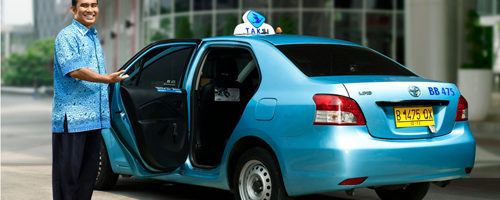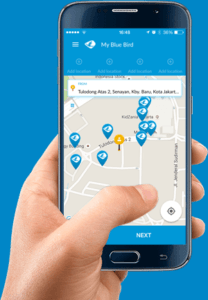Blue Bird flies high as an omnichannel taxi company

Most stories we hear in the transportation sector pit traditional incumbents (taxi companies) against digital newcomers (e.g. Uber). But can you imagine a world where the two parties collaborate and taxi companies embrace innovation? Welcome to Indonesia.
Blue Bird 101
Blue Bird is the largest taxi company in Indonesia with more than 30,000 vehicles, commanding roughly 50% market share [1]. The next largest player is only one-third its size. It has managed to revamp the Indonesian taxi industry by providing reliability and strong customer service by providing taxi drivers with training and professional development courses [2]. Despite being a traditional taxi company, Blue Bird is unlike its international peers in that it has embraced digitalization, being the first transportation company in Indonesia to release a GPS-enabled app back in 2011 [3].
Exhibit 1: Original Blue Bird app
The up and coming competitors: Ride-sharing apps
With a robust economy of 250 million people, Indonesia is seen as a key growth market for foreign ride-sharing companies and homegrown companies alike [4]. Currently, there are three main players in Indonesia: Go-Jek, Uber and Grab.
Exhibit 2: Tariff comparisons between competition [1]
In terms of scale, Go-Jek is Blue Bird’s biggest competitor with 200,000 riders [5]. However, they are not direct competitors because Go-Jek is an on-demand app for motorcycles. Backed by investors with deep pockets and being Indonesia’s first homegrown unicorn, Go-Jek has been able to expand to 14 business lines (e.g. Go-Food, Go-Massage, Go-Glam, Go-Pay). They recently launched Go-Car (an on-demand app for cars), which encroaches into Blue Bird territory.
While Uber and Grab have been wildly successful in other markets, they have been relatively weaker in Indonesia because they were second movers, had difficulties in complying with local regulations and were less flexible in adapting to the cultural norm of cash payments [6]. However, with aggressive pricing schemes, these companies are also eating into Blue Bird’s market.
Blue Bird evolves to stay relevant
Although Blue Bird had the foresight to launch an app relatively early on, they did not market it heavily because it had originally seen the app as “just another platform for customers to reach [their] drivers, just one platform among many others” [7]. Although the majority of rides have come from traditional channels (e.g. street, malls, hotels), Blue Bird expects significant growth potential through the digital platform. Accordingly, they’ve pivoted to dedicate resources in upgrading their app [7].
Exhibit 3: Newly upgraded Blue Bird app
The new app, My Blue Bird, incorporates features that allow customers to track the location of their booked taxi, hosts a ratings system and the ability to make advanced bookings [8].

Exhibit 4: Payment vehicle preferences by country in Southeast Asia [9]
Despite current preference for cash payments (Exhibit 4), government regulations favoring a move towards a cashless society mean that developing an e-payments infrastructure will be important in the future [10]. Anticipating this shift, Blue Bird has launched a cashless payment system capability in the new My Blue Bird app, while leaving open the option to use cash [11].
However, with increasing competition from ride-sharing apps, taxi drivers have become highly discontent, pushing for these apps to become illegal [12]. Instead of encouraging a standoff between taxi companies and ride-sharing apps, like other taxi companies have in other parts of the world, Blue Bird made it clear to its drivers that demonstrations against ride-sharing apps are illegal [13]. This has played to Blue Bird’s public perception advantage due to Indonesian netizens’ fanfare around ride-sharing apps [14].
Going a step further than discouraging demonstrations, Blue Bird made a strategic decision to enter into a technology, payment and promotion partnership agreement with its rival, ride-sharing app Go-Jek [15]. Specifically, in the short-term, Go-Jek apps will now feature a capability to make Blue Bird bookings and leverage Go-Jek’s Go-Pay payments infrastructure to facilitate more cashless payment options [16]. In the long-term, while detailed plans have yet to be announced, the partnership is expected to yield significant technology advancements in the transportation sector for the greater good of the Indonesian community [17].
Future possibilities
Being a big taxi company that has long abided by and lobbied on regulations, Blue Bird now holds an interesting position as both an incumbent seeking to protect traditional taxi companies and a partner of a ride-sharing newcomer looking to support the growth of the ride-sharing economy.
Ride-sharing apps in Indonesia suffer from a lack of stability in regulations: the government has vacillated from banning it one day and reversing the decision the next day [4]. With Blue Bird’s Go-Jek partnership, it has now also become in Blue Bird’s interest to provide more stability for regulations in the ride-sharing industry.
Because Blue Bird needs to balance both interests, Blue Bird could become a highly effective and relatively impartial party to negotiate regulations for the ride-sharing industry. If successful in drafting regulations, this could set a precedent for other countries to follow on how to best regulate this industry, thereby removing any vagueness behind the legality of ride sharing apps.
(800 words).
References
[1] Credit Suisse, Indonesia Transport Sector (2015), https://doc.research-and-analytics.csfb.com/docView?sourceid=em&document_id=x658913&serialid=vh0Bso4cU7hEi71m8VHIY8ZL8zy2SNLUAdntxl%2fAVto%3d
[2] Nikkei Asian Review, “Smooth ride for Blue Bird” (Feb. 6, 2014), http://asia.nikkei.com/magazine/20140206-ABE-on-ABE/Business/Smooth-ride-for-Blue-Bird?page=2
[3] Liputan 6, “Blue Bird: Kami moda transportasi berbasis aplikasi pertama di RI” (18 Mar. 2016), http://bisnis.liputan6.com/read/2462175/blue-bird-kami-moda-transportasi-berbasis-aplikasi-pertama-di-ri
[4] The Wall Street Journal, “Ride-sharing revival seen in Indonesia reshuffle” (Jul. 27, 2016), http://www.wsj.com/articles/ride-sharing-revival-seen-in-indonesia-reshuffle-1469621486
[5] Go-Jek website, https://www.go-jek.com
[6] World Economic Forum, The rise of the sharing economy in Indonesia (2016), https://www.weforum.org/agenda/2016/01/the-rise-of-the-sharing-economy-in-indonesia/
[7] Digital News Asia, “Indonesia taxi-hailing app pioneer Blue Bird aims to catch up” (Mar. 1, 2016), https://www.digitalnewsasia.com/indonesian-taxi-hailing-app-pioneer-blue-bird-aims-catch
[8] Liputan 6, “Blue Bird perkuat strategi teknologi” (May 20, 2016), http://tekno.liputan6.com/read/2511073/blue-bird-perkuat-strategi-teknologi
[9] Nielsen, Global saving and investing report (2014), http://www.nielsen.com/pk/en/insights/reports/2014/nielsen-global-saving-and-investing-report-january-2014.html
[10] Financial IT, “Indonesia moves towards cashless society” (Sep. 14, 2015), https://financialit.net/news/payments/indonesia-moves-towards-cashless-society
[11] Blue Bird, Announcement concerning material information or fact: Launching of cashless payment system in My Blue Bird application (2016), http://www.bluebirdgroup.com/wp-content/uploads/sites/4/2015/03/160909_Pengumuman_Keterbukaan-Informasi_BBD_Cashless-Payment_Eng_Sept-2016.pdf
[12] Asia One Digital, “Indonesian taxi drivers to rally for ban on online taxi apps” (Mar. 21, 2016), http://digital.asiaone.com/digital/news/indonesian-taxi-drivers-rally-ban-online-taxi-apps
[13] Liputan 6, “Blue Bird: Kami larang sopir taksi demo, itu agenda illegal” (Mar. 22, 2016), http://news.liputan6.com/read/2465199/blue-bird-kami-larang-sopir-taksi-demo-itu-agenda-ilegal
[14] Digital News Asia, “Indonesia lifts ride-sharing ban in quick ‘u-turn’” (Dec. 18, 2015), https://www.digitalnewsasia.com/indonesia-reverses-ride-sharing-ban-after-jokowi-and-users-say-no
[15] The Jakarta Post, “Blue Bird teams up with Go-Jek” (May 10, 2016), http://www.thejakartapost.com/news/2016/05/10/blue-bird-teams-up-with-gojek.html
[16] Kompas, “Apa bentuk kerja sama antara Blue Bird dan Go-Jek?” (May 10, 2016), http://tekno.kompas.com/read/2016/05/10/10450607/Apa.Bentuk.Kerja.Sama.Antara.Blue.Bird.dan.Go-Jek.
[17] Liputan 6, “Go-Jek dan Blue Bird, dari ‘lawan’ jadi ‘kawan’” (May 9, 2016), http://tekno.liputan6.com/read/2502450/go-jek-dan-blue-bird-dari-lawan-jadi-kawan
Image sources
Cover photo: https://cdn0.favehotels.com/v1/FaveWahidHasyim/Gallery/Bluebirdbigfave.jpg
Exhibit 1: https://sariandremo.files.wordpress.com/2014/04/blue-bird.jpg
Exhibit 3: http://www.bluebirdgroup.com/wp-content/uploads/sites/4/2015/03/BlueBirdApps1.png






Jolynn, I’m a frequent user of Blue Bird. When you think about the competition for Indonesia amongst ride-hailing (and ride-sharing apps) do you think Blue Bird is diverting a lot of their stable cash flows to compete against Uber / Go-Jek et al? I expect that the size of Blue Bird allows for this, but I wonder how this aligns with their shareholders. Do you foresee a similar deal between Uber and Blue Bird to that of Uber and Didi in China?
Thanks for a great read, Jolynn. This article provides a rare, contrarian view of Uber’s seemingly unstoppable dominance all across the world. Especially after the TOM Uber case, I was led to believe that Uber has a significant technological advantage, or edge, in terms of its data analytics. Is Blue Bird’s current success sustainable against Uber et al, or is its first mover advantage sufficient to snuff out the competition?